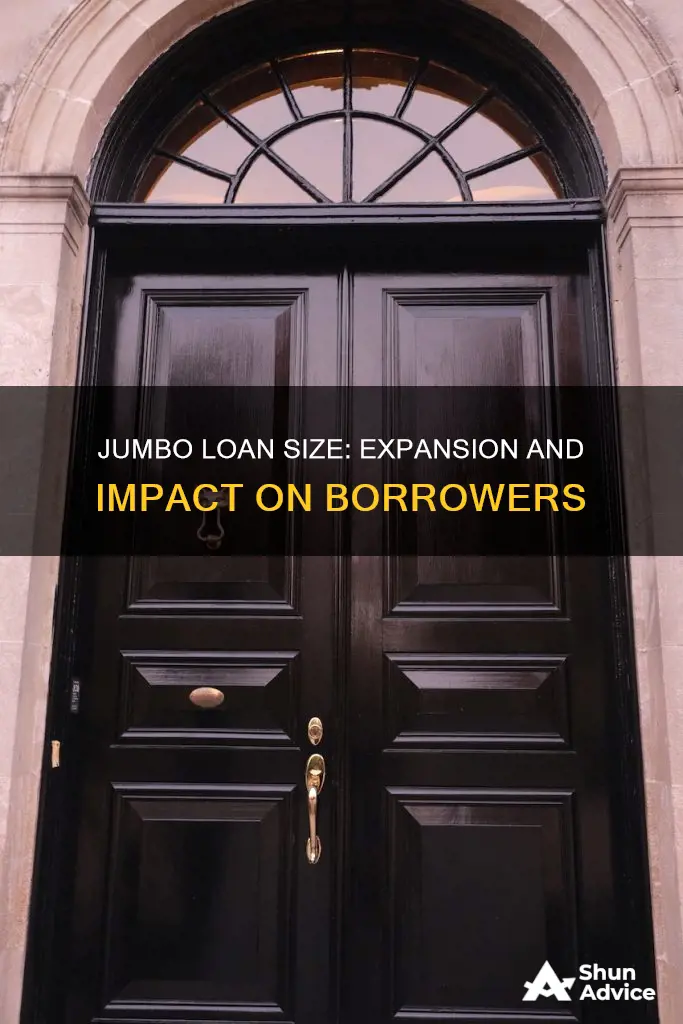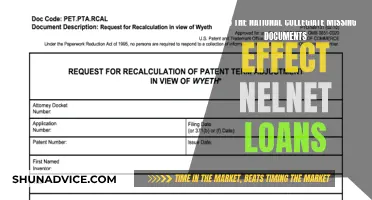
Jumbo loans, also known as jumbo mortgages, are loans that exceed the conforming loan limits set by the Federal Housing Finance Agency (FHFA). These loans are typically sought by individuals looking to finance luxury properties or homes in expensive real estate markets. The size of a jumbo loan can vary, with some lenders capping the loan amount at $2 million, $3 million, or $4 million, while others may offer loans of $5 million or more. Jumbo loans are considered non-conforming loans and are riskier for lenders as they cannot be guaranteed, purchased, or securitized by Fannie Mae or Freddie Mac, the major market makers for mortgages. As a result, jumbo loans have more stringent requirements and qualification rules, with borrowers needing a stellar credit score and a favourable debt-to-income (DTI) ratio.
| Characteristics | Values |
|---|---|
| Type | Home mortgage |
| Limit | Exceeds the conforming limits set by the Federal Housing Finance Agency (FHFA) |
| Amount | Varies, typically starting around $650,000 and can run into the millions |
| Conforming loan limit for single-family homes in 2024 | $766,550 in most of the US, up to $1,149,825 in some places |
| Conforming loan limit in 2025 | $806,500 to $1,209,750 depending on location |
| Credit score requirement | 700 or above |
| Debt-to-income (DTI) ratio | As low as possible, ideally no higher than 43% |
| Down payment | Usually starts at 10%, but can go up to 20% or more |
| Interest rate | Fixed or adjustable |
| Term | 15, 30, or 37-year loans |
What You'll Learn

Jumbo loan requirements
Jumbo loans are a type of financing that exceeds the limits set by the Federal Housing Finance Agency (FHFA) for conventional mortgages. They are used to finance properties that are too expensive for a conventional conforming loan. Jumbo loans are not eligible to be purchased, guaranteed, or securitized by Fannie Mae or Freddie Mac, which buy most of the mortgages in the US. This makes them riskier for lenders, and they are therefore subject to stricter requirements.
Jumbo loans also typically require a larger down payment than conforming loans, usually starting at 10% but going up to 20% or even more. The minimum down payment varies by lender. Jumbo loans can be structured as fixed-rate or adjustable-rate mortgage (ARM) loans, and they are available in various terms, such as 15-year, 30-year, or 7-year adjustable-rate.
Jumbo loans are considered higher risk, so lenders tend to examine applications more closely. They will review your credit report for any negative items, such as missed or late payments, foreclosures, and bankruptcy. Jumbo loans usually require manual underwriting, which involves a mortgage underwriter personally reviewing your financial details in-depth to weigh the risks. This helps the lender make a more informed decision.
Payroll Protection Loan: What's the Repayment Deal?
You may want to see also

Jumbo loan lenders
A jumbo loan is a type of home mortgage that exceeds the lending limits set by the Federal Housing Finance Agency (FHFA) for conventional mortgages. In 2025, the FHFA's loan limit for a single-family home in most of the US is $806,500, while in some high-cost areas, such as parts of California, New York, and Washington state, the limit can go up to $1,209,750. Homes that exceed these local limits require a jumbo loan.
Jumbo loans are considered riskier for lenders because they can't be guaranteed by Fannie Mae and Freddie Mac, meaning the lender bears the risk if the borrower defaults. As a result, qualifying for a jumbo loan is more challenging and typically requires a higher credit score, a larger down payment, and a lower debt-to-income (DTI) ratio compared to conventional loans. The minimum credit score for a jumbo loan is usually 700 or above, and the down payment can vary from 10% to 25% or higher.
When considering a jumbo loan, it is important to research multiple lenders as their requirements and offerings can vary. Here are some jumbo loan lenders to consider:
- Rocket Mortgage: Offers a variety of jumbo loan types, including FHA, VA, and adjustable-rate options. Their Jumbo Smart loan product does not require private mortgage insurance and has streamlined documentation requirements. However, their online application process could be improved.
- Citi: Provides competitive interest rates and offers closing cost credits and rate reductions for existing Citibank customers. In 2023, they originated the highest percentage of jumbo loans among NerdWallet-reviewed lenders.
- US Bank: Scores well for online convenience and rate transparency. They originated a higher proportion of jumbo loans in 2023 compared to the average reviewed lender.
- PNC: Does significant business in jumbo loans and will finance larger loan amounts compared to many other lenders. However, accessing customer service requires supplying personal information.
- Chase Bank: Finances jumbo mortgages of up to $9.5 million, which is higher than the limit set by most banks. They also offer interest-only jumbo loans with terms of 5, 7, or 10 years, and existing customers may qualify for rate discounts.
- SoFi: A good option if you want to put down less than 20% and avoid paying private mortgage insurance. SoFi does not require PMI, even on jumbo mortgages. They also offer a $10,000 credit towards closing costs if your mortgage doesn't close on time.
- Bank of America: Bank of America checking or investment account customers with a combined average daily balance of at least $20,000 may qualify for discounts on their mortgage rates and origination fees. They approve jumbo loans of up to $3 million on second homes and up to $1 million on investment properties.
- Navy Federal Credit Union: The largest VA lender in the US, making it a good choice for active-duty service members or veterans looking to buy a high-priced home. They will waive their 1.00% origination fee if you opt for a 0.25% rate increase, and they guarantee to match competitor rates or pay you $1,000 after closing.
- PRMI Dallas: Offers jumbo loan options in Dallas, Texas, and can help match you with a jumbo loan program that meets your specific needs.
Military Loans: Impact of Government Shutdown
You may want to see also

Jumbo loan interest rates
Jumbo loans are a type of financing that exceeds the lending limits set by the Federal Housing Finance Agency (FHFA) for conventional mortgages. Jumbo loans are also known as jumbo mortgages. Jumbo loan interest rates are usually higher than rates on conforming loans, but they can dip below conforming rates on occasion. Jumbo loan interest rates vary at every financial institution. Jumbo loans can be 30-year loans or shorter. They are available with either a fixed interest rate or an adjustable rate.
The Federal Housing Finance Agency (FHFA) sets the conforming loan limits, which change every year based on median home prices. For 2025, the upper limit is $806,500 to $1,209,750 depending on location. Homes that exceed the local conforming loan limit require a jumbo loan. Jumbo loans are considered riskier for lenders because they can't be guaranteed by Fannie Mae and Freddie Mac, meaning the lender is not protected from losses if a borrower defaults. Jumbo loans are also nonconforming, which means underwriting guidelines can stray from the expected and lenders can offer alternatives, like bank statement loans.
Qualifying for a jumbo loan is more difficult than for a conventional loan. The minimum credit score required for a jumbo loan depends on the mortgage lender, but it's usually at least 700. Many lenders look for a debt-to-income (DTI) ratio of no higher than 43%. Jumbo loan down payments usually start at 10%, but depending on your other assets, you could be required to put down more — perhaps even going above 20%.
Understanding Private Loan Disbursement: Who Receives the Funds?
You may want to see also

Jumbo loan vs conventional loan
Jumbo loans, also known as jumbo mortgages, are a type of financing that exceeds the limits set by the Federal Housing Finance Agency (FHFA) for conventional mortgages. In other words, jumbo loans are used to finance properties that are too expensive for a conventional loan. The FHFA sets the conforming loan limits annually, and these limits determine whether mortgages are eligible for purchase by Fannie Mae and Freddie Mac.
The primary advantage of a jumbo loan is that it allows borrowers to take out a mortgage that exceeds the conforming loan limits put in place by the FHFA. The conforming loan limit for single-family homes in 2024 is $766,550 in most of the US but can be as high as $1,149,825 in some places. Jumbo loans typically start around $650,000 and can run into the millions. Some lenders may cap the size of a jumbo loan at $2 million, $3 million, or $4 million, while others may allow borrowers to take out $5 million or $10 million loans.
Qualifying for a jumbo loan is generally more difficult than qualifying for a conventional loan. Jumbo loans typically have higher credit, income, and cash reserve requirements. Borrowers typically need a credit score of 700 or above and a low debt-to-income (DTI) ratio to qualify for a jumbo loan. The typical qualifying DTI ratio for a jumbo loan is 43% to 45%, while for a conventional loan, it is 50% or less. Jumbo loans also usually require a larger down payment than conventional loans, with a minimum down payment of 10% and often 20% or more. Additionally, jumbo loans have stricter loan-to-value (LTV) ratio requirements than conventional loans, typically requiring an LTV of 80% or lower.
Jumbo loans are considered riskier for lenders because they cannot be guaranteed or insured by Fannie Mae or Freddie Mac. As a result, jumbo loans generally have higher interest rates than conventional loans, though this is not always the case and can depend on market demand. Jumbo loans also typically have higher closing costs and a longer loan processing time due to the extra qualification steps involved.
Missing Documents: Nelnet Loans and National Collegiate's Impact
You may want to see also

Jumbo loan limits
Jumbo loans are a type of home mortgage that exceeds the lending limits set by the Federal Housing Finance Agency (FHFA) for conventional mortgages. The FHFA publishes annual conforming loan limit values that apply to all conventional loans delivered to Fannie Mae. These limits vary by county and are based on median home prices. For 2025, the upper limit is between $806,500 and up to $1,209,750 depending on location. Homes that exceed the local conforming loan limit require a jumbo loan.
Jumbo loans are considered riskier for lenders because they can't be guaranteed by Fannie Mae and Freddie Mac, meaning the lender is not protected from losses if a borrower defaults. Since they can't be resold, jumbo loans generally remain on the lenders' own books, making them a type of portfolio loan.
Qualifying for a jumbo loan is more difficult than for a conventional loan. The minimum credit score required for a jumbo loan depends on the mortgage lender, but it's usually at least 700. Many lenders look for the debt-to-income (DTI) ratio to be no higher than 43%. The minimum down payment on a jumbo loan varies by lender, but expect to put down at least 10%, if not 20%.
While they’re easy to find, jumbo loans aren’t all the same. Some lenders might cap the size of the loan at $2 million, $3 million, or $4 million, while others might be willing to lend significantly more, such as $5 million or $10 million. Jumbo loans can be 30-year loans, or you can opt for a shorter term. They are available with either a fixed interest rate or an adjustable rate.
Stimulus Package: EIDL Loans Included or Excluded?
You may want to see also
Frequently asked questions
A jumbo loan is a type of home mortgage that exceeds the lending limits set by the Federal Housing Finance Agency (FHFA) for conventional mortgages.
The amount you can borrow with a jumbo loan varies by lender. Some lenders might cap the size of the loan at $2 million, $3 million, or $4 million, while others might be willing to lend you significantly more, such as $5 million or $10 million.
The requirements for a jumbo loan are typically more stringent than those for a conventional loan. You will need a high credit score, a low debt-to-income (DTI) ratio, and a large down payment, typically starting at 10% but potentially going up to 20% or more.
Jumbo loans are offered by private lenders such as banks, credit unions, and mortgage companies. Traditional banks may offer lower interest rates on jumbo loans as an incentive to attract well-heeled borrowers.







